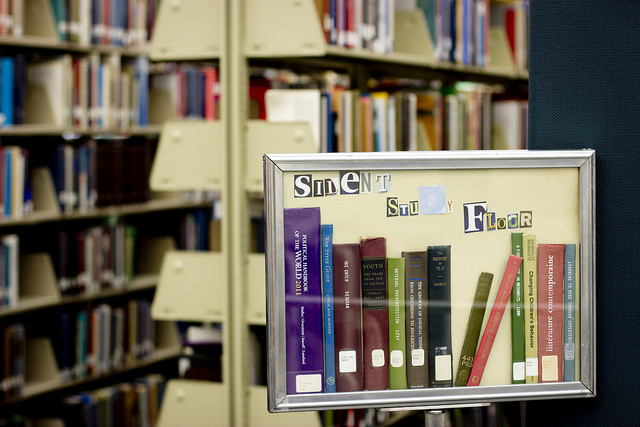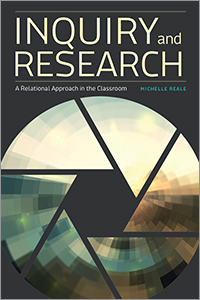Michelle Reale on igniting a spirit of inquiry in students
How do you guide students to move beyond just finding answers and towards critical thinking? It's exactly the approach Michelle Reale outlines in her new book Inquiry and Research: A Relational Approach in the Classroom. An associate professor and head of access services and outreach at Arcadia University, she took some time out from her duties to speak with us about the epiphany behind writing the book, the role of reflective practice in information literacy, and much more.
This is your fifth book for ALA Editions. What makes it unique from the others?
Great question. While I believe and hope that this book is as practical as the others, I think it is a bit philosophical, too. I think with each book I have tried to delve deeper and deeper somehow into the core of my own practice. Each book that I have written reveals a preoccupation that I have at any given time in my praxis. This book is perhaps unique because it focuses on what I have come to believe is one of the main problems in student research: the lack of inquiry, whether it be guided or mediated; a clear lack of curiosity coupled with the pressure to focus way too early in the process. Over and over I have seen the same problems. Students simply want answers — they want whatever it is that will help them to provide a quick and adequate answer, they seek sources for the sake of having sources, not because they are particularly the best to have. Why is that? I believe it is a lack of curiosity, a lack of personal connection with any given topic, and feeling as though they must focus their topics right away , which leaves out an integral part of any research project: inquiry, the asking of questions in order to find answers. So many students skip the most important aspect of research:  asking good questions. They seek answers that are disconnected from any line of questioning or an attempt to satisfy curiosity in order to gain a sort of “deep knowing.” So in this book, the process and importance of inquiry is first and foremost. Writing this book was a revelation to me about my own process!
asking good questions. They seek answers that are disconnected from any line of questioning or an attempt to satisfy curiosity in order to gain a sort of “deep knowing.” So in this book, the process and importance of inquiry is first and foremost. Writing this book was a revelation to me about my own process!
The central theme of your book seems to be, what can you do to take students who seem disengaged and kindle their curiosity? Could you share an anecdote from your own teaching experience that points to why you chose this theme for your book?
I was (and still am) seeing how consistently students try to get to answers, often before they even understand what is being asked of them! I was in the front of a class of students, who seemed somewhat engaged, but at the same time a bit impatient. I began to engage them in questions about their topics. There were four topics spread evenly amongst the 16 students in the class. I was trying to engage them in conversation (research as conversation — literally!) but every time I asked a question, they’d start typing on their laptops, or they were clicking away on the mini keyboards of their phones! “No, no,” I said, a bit more impatient than I meant to. “Stop. I want to hear what you think!" This stopped them dead in their tracks. “What I think?” a girl with long red locks and a purple knitted cap that came to the top of her eyeglasses, said, a bit exasperated. “Yes, what do you think,” I answered. “It doesn’t matter what I think,” she responded, “I just need to know how to find information to get this paper done.” This was one of those sessions that I reflected on and realized that I’d been and exasperated by, and unfortunately expressed that by my behavior. I felt impatient. I know the anxiety students feel about perhaps not finding the information they desperately need to start, let alone complete an assignment, but right to my core, I felt that simply showing them databases wouldn’t work in the long term. They might find their “answers,” or the sources that could provide the “answers,” but they wouldn’t be learning anything at all that would be universal to the research process, that they could transfer to other subjects in other classes or learning situations.
Sparking that spirit of inquiry is really important, but sometimes professors offer pushback to that approach. And they might have good reasons for doing it! What advice do you have for overcoming such objections?
One of the ways to mitigate that pushback is to know what you are getting into when you are going into the classroom. Ideally, at least one conversation, no matter how cursory, has taken place between you and the professor of the class, in which you both have the opportunity to express expectations to one another. I may not particularly agree with a professor’s approach in the classroom as it pertains to what they might want to cover, but the classroom is not a battlefield , nor should it be. Being respectful and collegial is important. You can always deliver content as requested, but recognize the opportunity, then, for a further conversation with the professor and the fertile ground for collaboration in the future. Professors will push back — and we can push as well. Indeed, if we did not believe in our mandate, that what we do makes a difference and that we might have a better why, why aren’t we asserting that.
Also, librarians would do well to remember there are other ways and other opportunities to encounter students, and the classroom is just one of those places. When I do a session, I like to pass around a contact sheet in the classroom where students write their name and university email address. After the class, I attempt to close the circle by emailing the students and further explaining that I am here to help them with any of their information seeking needs. This has proved an extremely valuable tactic, as it is an open invitation, initiated by me. It has helped me to extend the work that I can  do with students , ensuring that they feel supported — because no one learns anything in a 55-minute session. I see this reaching out (such a simple gesture, really) as an ethic of care. It goes beyond the professor, who is not and should not be the arbiter of all learning. We can extend our reach beyond the info lit sessions we teach and continue the conversation with students who are willing and maybe gently persuade those who are not so willing. The gesture of emailing them, individually, while time consuming, is a step in the right direction: even if they don’t take you up on your offer this time, they now have more of a comfort level in knowing a librarian to reach out to when they really do need help. In my own experience, this small gesture has netted big dividends.
do with students , ensuring that they feel supported — because no one learns anything in a 55-minute session. I see this reaching out (such a simple gesture, really) as an ethic of care. It goes beyond the professor, who is not and should not be the arbiter of all learning. We can extend our reach beyond the info lit sessions we teach and continue the conversation with students who are willing and maybe gently persuade those who are not so willing. The gesture of emailing them, individually, while time consuming, is a step in the right direction: even if they don’t take you up on your offer this time, they now have more of a comfort level in knowing a librarian to reach out to when they really do need help. In my own experience, this small gesture has netted big dividends.
One of your chapters talks about “cognitive apprenticeship.” How would you define that and what forms can it take?
Everyone is afraid to fail. Everyone. In learning situations there is a sort of collective mentality that no one wants to be wrong about anything, which is what makes “thinking” and “curiosity” such scary perspectives; it might take you down a road you feel like you don’t have time to travel or it may disabuse you of notions you have held deeply, for a long time. Students are not aware of being in a state of cognitive apprenticeship, and maybe they shouldn’t. Maybe the way to be is simply to do. Again, I think as librarians and educators we have to look at the way that we are doing our instruction sessions, and construct them in a way that nurtures and encourages the cognitive apprenticeship of learning how to think, ask questions, change our minds based on new information and being able to “talk back” to research that we find that we disagree with. I have written about this before: students do not realize nor do they truly understand that when they embark on research and they write a paper on any given topic that they are adding to knowledge and contributing to an ongoing and exciting conversation. But the way that we often teach , mainly because we are asked to teach, is to go into classrooms and point and click. We try to cover too much. Databases, OPACs, plagiarism, evaluating websites/books, etc. all in one session! No wonder students can’t figure out anything about the library! While proprietary databases are wonderful tools, we are not paid representatives of the companies that produce them. We are in the business of learning. How to use a database isn’t that difficult — but thinking is. But it doesn’t have to be. Librarians are perfectly situated to be able to narrow down what we are willing to cover in the name of students actually being able to leave one of our sessions actually knowing something or at least being on the cusp of knowing something. We can teach them to think, by looking at research as a way of being on the road to find out, a way of knowing.
Where does reflection, on the part of both educators and learners, fit into your relational approach?
At the risk of sounding like a broken record it is so integral to my praxis that I don’t think that I could possibly teach without it. Being a self-aware educator is extremely important to me. Reflection is an amazing tool to be able to processes and evaluate our experiences, of being to look back and  assess ourselves in our learning and teaching situations. What works? What doesn’t? How did I feel in a particular moment? There is fear in learning new things, as well as teaching new things — even teaching old things! I personally have a fear of letting students down, that what I give them in the classroom won’t be enough, that I will fall short every time. Reflecting on those experiences helps me enormously. The truth is I sometimes fail, and the reasons are sometimes the same , but sometimes they are different, too. I might be tired, students might be tired, I may be ill-prepared, not have enough support from the professor in the class, failed to receive the student assignment I’d asked for several times, etc. I also know that, I sometimes do well, sometimes I do really well. I will do my reflective writing and note the questions I was asked, the interest in the students’ faces, their participation, the courtesy of the professor in the classroom, the students who asked for a one-on-one consultation from a particular session and how I felt about it all. I know these things because I process them in a reflective journal.
assess ourselves in our learning and teaching situations. What works? What doesn’t? How did I feel in a particular moment? There is fear in learning new things, as well as teaching new things — even teaching old things! I personally have a fear of letting students down, that what I give them in the classroom won’t be enough, that I will fall short every time. Reflecting on those experiences helps me enormously. The truth is I sometimes fail, and the reasons are sometimes the same , but sometimes they are different, too. I might be tired, students might be tired, I may be ill-prepared, not have enough support from the professor in the class, failed to receive the student assignment I’d asked for several times, etc. I also know that, I sometimes do well, sometimes I do really well. I will do my reflective writing and note the questions I was asked, the interest in the students’ faces, their participation, the courtesy of the professor in the classroom, the students who asked for a one-on-one consultation from a particular session and how I felt about it all. I know these things because I process them in a reflective journal.
Reflection demands honesty or growth and understanding cannot take place. The reflective journal is no place to lie to yourself. The goal is true processing of experience and change. I am always stumped at how many educators will implement reflective practices in classroom assignments , but have no experience doing the same thing, and then actually grade students’ reflective pieces! Reflection is not something you do when you feel miserable — like writing in your seventh grade diary about the boy who didn’t ask you to the dance. You write through the good , the bad and the ugly to be able to see a depth and breadth of experience. How can I know my students as learners if I don’t know myself as an educator?
Learn more at the ALA Store.
